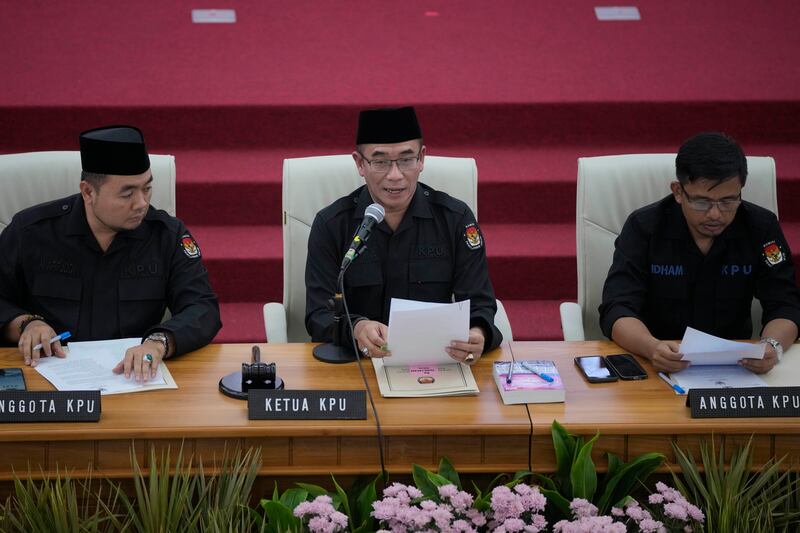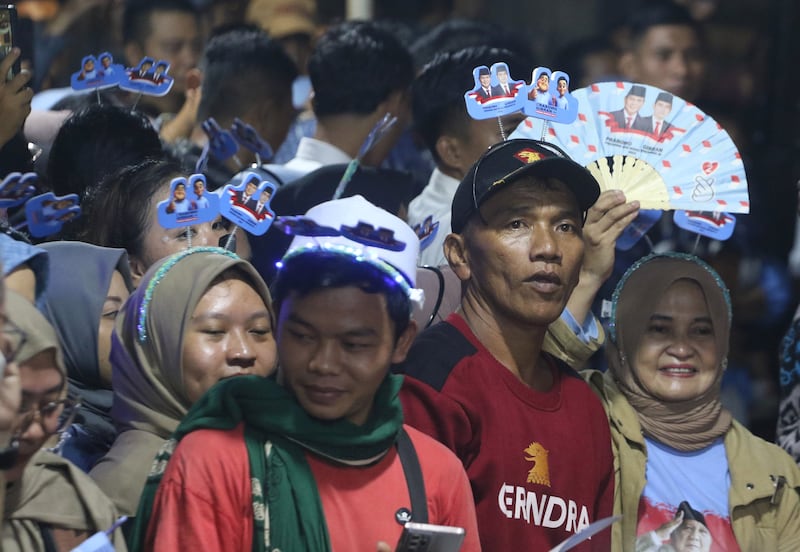Prabowo Subianto, the former Indonesian general whose human rights record has faced scrutiny, will take over as leader of his country after clinching victory in the presidential election and securing 96.2 million votes, according to official results unveiled Wednesday.
The Feb. 14 polls saw Prabowo receive 58.61% of the vote, far outpacing former Jakarta Gov. Anies Baswedan who received 24.9%, and former Central Java Gov. Ganjar Pranowo who received 16.5%, according to the General Elections Commission.
Prabowo, 72, emerged victorious in his third run at the presidency of Southeast Asia's largest country after putting the eldest son of the outgoing but popular president on the ticket as his running mate, and despite allegations that the vote and the courts were tampered with.
“The election we have just conducted has been recognized by the global community and has been conveyed to me through statements and letters by many heads of state, governments and ambassadors,” Prabowo told reporters at his Jakarta home.
“Those who monitored our election said they were very impressed with its smoothness, its orderliness, and the calm, coolness, and joyful atmosphere that was felt on Election Day.”
A former army special forces commander who had been married to a daughter of the late dictator Suharto, Prabowo, who serves as defense minister, thanked the Indonesian people. He called for unity, saying that he had respect for those who voted for his opponents.
An election official, meanwhile, said the vote was fair.
“We apologize for any shortcomings in the conduct of the 2024 elections,” Hasyim Asy’ari, chairman of the General Elections Commission, said during a meeting certifying the results. “We have strived to be as honest and transparent as possible in organizing the elections.”
The U.S. State Department congratulated Prabowo on his victory and praised the Indonesian people “for their robust turnout and commitment to democracy and the rule of law.”
“We look forward to partnering closely with President-elect Subianto and his administration when they take office in October,” U.S. Secretary of State Antony Blinken said in a statement.
Prabowo has pledged to bolster Indonesia’s economy and military prowess. His campaign promises included free lunches and milk for school students across the country.
Prabowo is to be inaugurated on Oct. 20, succeeding rival-turned-ally Joko "Jokowi" Widodo, who remains popular after nearly decade in power. Prabowo lost to Jokowi in the 2014 and 2019 presidential elections.
This year's election has faced criticism for what some perceive as a decline in democratic standards. Allegations of nepotism surfaced following a contentious Constitutional Court ruling that allowed Jokowi's eldest son, Gibran Rakabuming Raka, 36, to run as Prabowo's vice president.
Two watchdog groups have labeled this election as the worst since Indonesia’s transition to democracy 25 years ago, citing issues with campaign finance and electoral fraud.

Both Anies and Ganjar have declared their intent to c hallenge the results, alleging widespread fraud and vote-buying.
Reacting to the official results, Anies emphasized the importance of the electoral process over the final outcome.
“The integrity of the electoral process is fundamental to the continuity of democracy and the fulfillment of the people’s aspirations as a whole,” Anies said in a statement.
“A leader born from a tainted process would lead to a regime full of injustice, which is not the desired outcome,” he said.
Hundreds of Indonesians took to the streets of Jakarta this week to call for Jokowi’s ouster over alleged electoral fraud.
Authorities deployed thousands of police to secure key locations in anticipation of further unrest after the coalition threatened over the weekend to hold larger protests against the election results.
Previously, Indonesia was praised for its successful transition from Suharto’s authoritarian rule to a vibrant democracy.
However, from the Constitutional Court's October decision to Prabowo's ascension to power, questions have been raised about the state of democracy in the country.
Jokowi was also accused of using populist measures, such as handing out social aid early and raising salaries for civil servants, police and the military during the election campaign, which critics said were aimed at boosting Prabowo’s chances.
The president denied any manipulation of the judiciary or favoring a particular set of candidates.
Jokowi did not publicly endorse any candidate for president, but critics alleged that his administration had tampered with government materials and influenced the judiciary to ensure a victory for Prabowo and Gibran.

Prabowo’s victory followed a massive rebranding effort to soften his image from that of a fiery ex-general to a cuddly or cute grandfather figure.
The president-elect has been dogged by his links to alleged human rights abuses throughout his political career.
After graduating from the Indonesia Military Academy in 1974, he rose through the ranks to command the army’s elite special forces unit, known as Kopassus.
In 1983, he married Siti Hediati Hariyadi, the daughter of President Suharto, and in 1998 became head of the Army Strategic Reserve Command.
That same year, he was discharged from the military after a council of honor officers found him guilty of several violations, including involvement in the abduction and disappearance of pro-democracy activists during student protests that led to Suharto’s downfall in May 1998.
Prabowo has denied any wrongdoing and said he was only following orders from his superiors. He has never been tried in a civilian court for the alleged crimes.
Last year, Jokowi acknowledged 12 severe human rights violations committed by the Indonesian state dating back to the 1960s, including the 1998 abduction of the pro-democracy activists.
